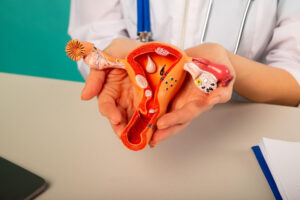Ovaries, often described as nature’s miniature factories, are pivotal organs in the female reproductive system. They produce eggs, or ova, which, when fertilized by sperm, initiate the journey of life. Beyond egg production, ovaries also secrete essential hormones like estrogen and progesterone, crucial for regulating menstrual cycles and supporting pregnancy.
When it comes to fertility, countless factors contribute to a woman’s ability to conceive. From hormonal balance to overall health, understanding what influences fertility is key. One common question among women trying to conceive is: How important is ovary size in getting pregnant? It’s not just about the size of the ovaries, but the health of the eggs and the entire reproductive system. In this blog, we’ll explore how ovary size impacts fertility, the myths surrounding it, and how it fits into your journey toward parenthood.
What are Ovaries and What is Their Role in Fertility?
The ovaries are essential organs in the female reproductive system. They are responsible for producing eggs (ova) and secreting hormones such as estrogen and progesterone, which regulate menstrual cycles and support pregnancy. Think of your ovaries as the “production house” where eggs are created and hormones are produced. Their health and function are closely linked to your fertility.
Normal Ovary Size: A Quick Glance
A typical ovary measures around 3.5 cm by 2.5 cm by 1.5 cm. However, ovary size can fluctuate due to various factors throughout a woman’s life. Factors such as age, hormone levels, and health conditions can all influence ovarian size. For example:
- During puberty, ovaries grow in size as they start producing eggs.
- In reproductive years, the ovaries maintain a relatively consistent size.
- After menopause, ovaries shrink due to reduced hormone production.
Factors That Affect Ovary Size
Ovary size is influenced by several key factors, including age, health conditions, and fertility treatments. Here’s how each one plays a role:
Age and Ovary Size
As a woman ages, her ovarian reserve, or the number of eggs in her ovaries, naturally decreases. The ovaries also tend to shrink in size as women approach menopause. This reduction in ovarian reserve can affect fertility. Younger women typically have more eggs and may have slightly larger ovaries compared to women in their late 30s and 40s. As a result, ovaries in older women may show reduced size, reflecting a lower egg count.
Ovarian Disorders: PCOS, PCOD, and Ovarian Cysts
Polycystic Ovary Syndrome (PCOS) and Polycystic Ovarian Disease (PCOD) are common conditions that can lead to enlarged ovaries. Women with PCOS and PCOD often have multiple small cysts within their ovaries, making them appear larger on ultrasounds. However, while these larger ovaries may seem like they contain more eggs, they can actually impair fertility due to hormonal imbalances that prevent ovulation.
On the other hand, ovarian cysts can cause the ovaries to enlarge temporarily. Most cysts are benign and often resolve on their own, but large cysts may interfere with egg production or cause pain.
Fertility Treatments and Ovary Size
In fertility treatments such as IVF or ovarian stimulation, ovary size can change. Hormonal stimulation involves medications to encourage the ovaries to produce multiple eggs in one cycle. This process temporarily enlarges the ovaries, making them capable of producing several mature eggs for retrieval.
Pregnancy and Ovary Size
During pregnancy, the ovaries increase in size slightly to support the growing fetus and produce hormones like progesterone, essential for maintaining a healthy pregnancy.
Beyond Size: The Importance of Egg Quality
While ovary size may give some insight into ovarian reserve, the quality of the eggs plays a much more significant role in fertility. As women age, egg quality declines, which is why younger women tend to have better chances of conception. Factors like lifestyle (nutrition, stress, exercise) and underlying health conditions can also affect egg quality.
A woman’s ovarian reserve (the total number of eggs available) does not necessarily determine her chances of conceiving. What matters more is the health and quality of those eggs. Even women with smaller ovaries can conceive and carry a healthy pregnancy, provided their eggs are of good quality.
How to Improve Ovary and Egg Health
While ovary size is important, improving egg quality is often a more effective way to enhance fertility. Here are several steps that can help improve overall reproductive health:
- Maintain a Healthy Weight: Obesity can disrupt hormonal balance and negatively impact fertility.
- Exercise Regularly: Physical activity is essential for overall health and reproductive health.
- Manage Stress: Chronic stress can affect hormone production and ovulation.
- Eat a Balanced Diet: A diet rich in fruits, vegetables, whole grains, and lean protein supports reproductive health.
- Avoid Smoking and Excessive Alcohol: Smoking and alcohol damage eggs and reduce fertility.
The Myth of the “Perfect” Ovary Size
There’s a common misconception that larger ovaries are better for fertility, but this is not always the case. Here’s why:
- Larger Ovaries and PCOS: While enlarged ovaries can indicate higher egg reserves, they might also point to PCOS, a condition that can cause hormonal imbalances and disrupt ovulation. In such cases, larger ovaries may actually hinder fertility rather than improve it.
- Smaller Ovaries and Fertility: On the other hand, women with smaller ovaries can still conceive, especially if their eggs are of good quality. Egg quality, not quantity, plays a more significant role in successful conception.
Evaluating Ovary Size and Fertility Potential
When trying to conceive, ovary size is just one part of the puzzle. To gain a clearer picture of fertility potential, several factors must be considered:
- Hormonal Levels: Testing levels of hormones like FSH (Follicle-Stimulating Hormone) and AMH (Anti-Müllerian Hormone) can provide insights into ovarian function and egg reserve.
- Ovarian Reserve: While ovary size can provide some clues, AMH levels are a better predictor of how many eggs are left and their quality.
- Uterine and Tubal Health: Ensuring that the uterus is healthy and the fallopian tubes are clear is essential for successful conception.
Working with a fertility specialist can help you understand these factors in detail and create a personalized plan for your fertility treatment.
When to Consult a Fertility Specialist
While ovary size is an important factor in fertility, it’s not the only determining factor. Factors like egg quality, hormonal health, and lifestyle choices play a more significant role in successful conception. Understanding these aspects and consulting with a fertility specialist can increase your chances of achieving a healthy pregnancy.
If you’re having trouble conceiving or suspect your ovary size may be affecting your fertility, consulting a fertility specialist is crucial. A fertility expert will assess your ovarian reserve, hormone levels, and overall reproductive health to develop a personalized treatment plan.
At Boon IVF, we understand that every couple’s path to parenthood is unique. Our team of experienced fertility specialists provides personalized care, carefully considering all aspects of your reproductive health, including the size of the ovary. By tailoring evidence-based treatments to your individual needs, we ensure that you receive the most effective care. If you’re facing challenges with conception, consult us today to explore the best options for achieving your dream of parenthood.


